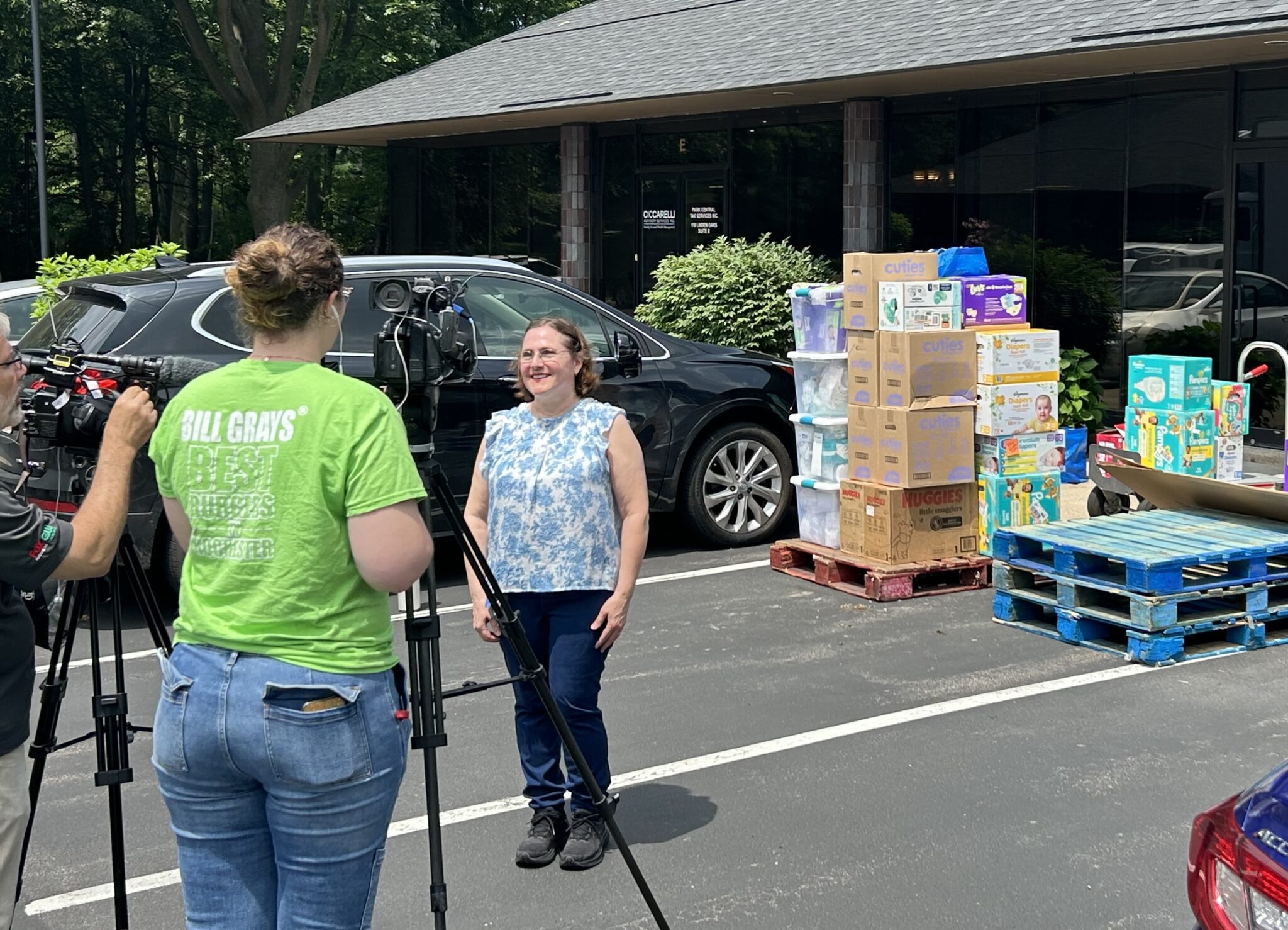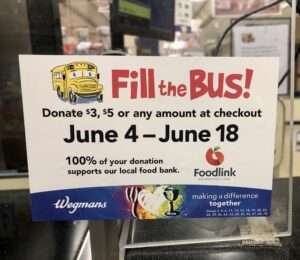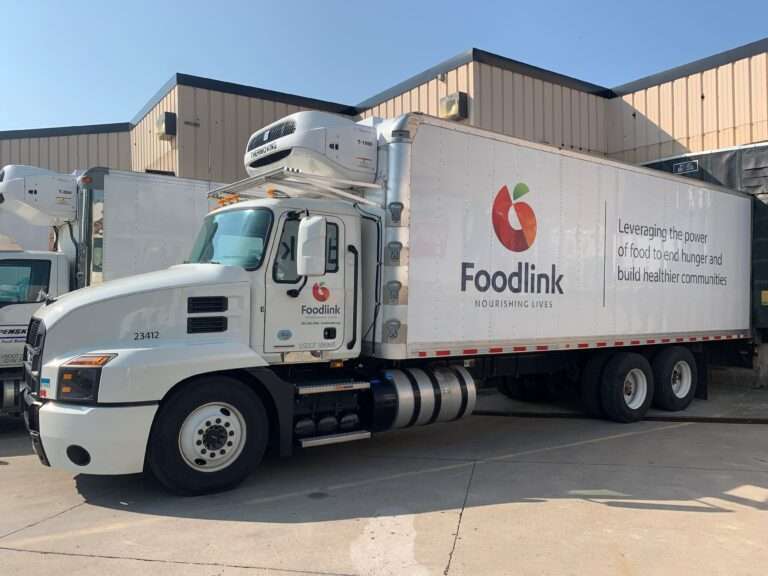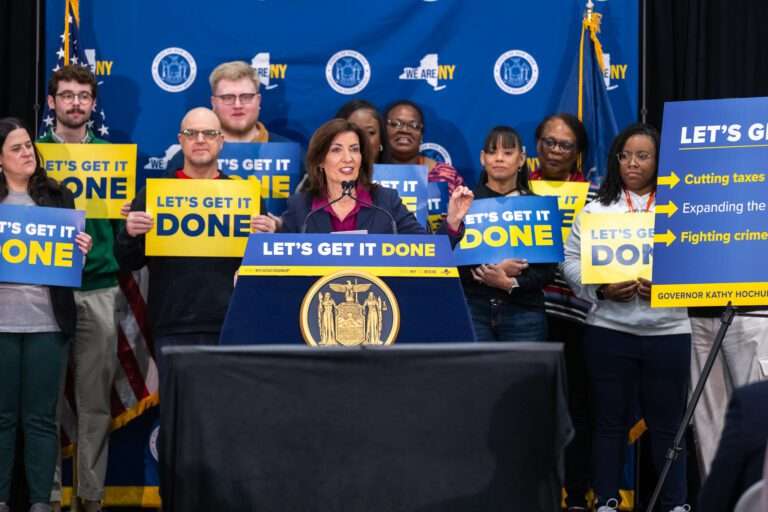The following written testimony was submitted by Whitley Hasty to the U.S. Senate’s Subcommittee on Food and Nutrition, Specialty Crops, Organics and Research on Wednesday, April 19, 2023.
Hasty was invited by Sen. John Fetterman (PA) and Sen. Kirsten Gillibrand (NY) to share her personal experience with SNAP, and how it positively impacted her life — both as a child and as a mother raising two children in Rochester. Hasty was formerly a Curbside Market Ambassador for Foodlink, and now serves as a WIC Outreach Specialist, in partnership with Hunger Free America, after the Curbside Market recently became the first mobile market in the nation to sell WIC-eligible foods.
Hasty provided up to 5 minutes of oral testimony in front of the subcommittee, but was permitted to provide a lengthier statement as her written testimony, which is what is written below.
Visit the Senate’s website to view coverage of the hearing.
My name is Whitley Hasty and I’m honored to be here today to share how the Supplemental Nutrition Assistance Program (SNAP) has positively impacted the lives of me and my children. Thank you to Chair Fetterman for holding this hearing and inviting me to testify. I also thank my own senator, Senator Gillibrand, for continuously championing solutions to end hunger.
I am a proud mother of a 7-year-old daughter who is sweet and protective, hilarious, and cautiously independent. My 3-year-old son is the opposite of his sister; he is grounded, generally likes to follow the rules, and has such an unlimited curiosity about everything.
They are the center of my world, and I do everything I can to be present and active in their lives, from attending gymnastics classes, to hosting sleepovers, and volunteering as Vice President of the PTSO at our local school. I work hard to model for my kids the importance of civic and community duty.
I’m raising my children the way my mother raised me. She almost never missed a day of work and still made time to support four children participating in multiple activities at three different schools. She earned a modest salary and often bluntly describes our upbringing as “one flat tire away from an eviction.” We often do not see the sacrifices our parents make until we grow up and make them ourselves. With the help of SNAP, we were able to shop for healthier foods rather than get by with just the basics. As the oldest, I learned how to grocery shop on a limited budget and maximize the nutrition for our family.
Working since the age of 13, I have always craved the independence that comes with making an honest income. Even during college, while on scholarship, I held down two jobs at the campus dining hall and at Wegmans. My resume is lengthy, as I have always been willing, able, and ready to work. I’m proud of my strong work ethic and career advancement, but also know much of what I have accomplished could not have been achieved without SNAP.
In 2015, I obtained both SNAP and WIC during my prenatal care. Applying for both was a really difficult process; the two applications being separate meant that I missed work twice and lost wages to visit DHS at 8am, only to wait in line for hours with dozens of other families. I am grateful to the government caseworker who helped me navigate the process, and I know the staff tried to make it as seamless as possible, but I do understand why some eligible participants are too intimidated to apply. That’s why I support Senator Gillibrand’s proposal to make it easier for states and counties to enable eligible people to apply for multiple programs simultaneously online.
Receiving SNAP absolutely helped my family eat healthier. We ate less processed foods, and I started cooking new recipes. I used SNAP to shop not only at grocery stores, but also at farmer’s and mobile markets like Foodlink’s Curbside Market. I utilized incentive programs to maximize my budget and help prioritize fruits and vegetables through programs such as Double Up Food Bucks, which is funded partially through the USDA GusNIP grant.
When the pandemic hit, I was grateful to receive an increase in SNAP benefits. My son was born two months earlier, before the world turned upside down. The SNAP emergency allotments provided by Congress enabled me to stretch my food budget so that I could keep the heat and lights on. I am a perfect example of how legislation reduced poverty and hunger during one of the largest economic collapses of our lifetimes.
My life refutes the most common SNAP myth; receiving benefits was never a deterrent for me to work. I continually worked or sought work while receiving SNAP, and that is true of most SNAP recipients. A close, old friend of mine recently celebrated the achievement of financial security when she no longer qualified. I can relate to that. If Congress wants to reduce the use of SNAP, it should raise the minimum wage, increase the Earned Income Tax Credit, and boost wage, childcare, and transportation subsidies.
I’m proud that my work at Hunger Free America and Foodlink has meant not only that I no longer need SNAP benefits, but that I can now pay it forward by helping others in my community.
Every day I witness how the recent end of the SNAP emergency allotments has impacted the diverse communities that I serve; overnight, the minimum monthly benefit for many seniors fell from $281 to just $23. My hope is that this esteemed body again increases SNAP benefits to better help struggling Americans cope with skyrocketing costs for rent, utilities, childcare, and yes, food.
I am thankful that SNAP and WIC helped my family through challenging times, and that I am now able to give my kids a bright future. I hope my story encourages you to strengthen SNAP in the Farm Bill.
*** Denotes where Whitley’s oral testimony given at the hearing ends, and where the full written testimony continues ***
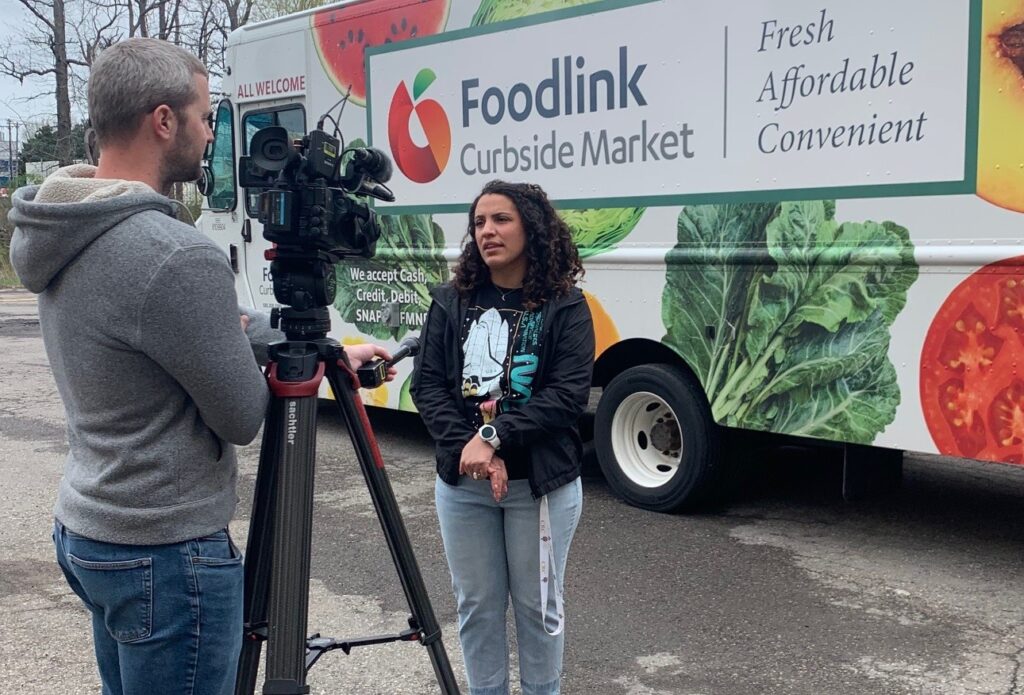
It remains a vital truth that food is medicine, and should be regarded as such. I have had the privilege of seeing the “food is medicine” theory come to life while connecting with people almost daily to hear about their needs and assist them with accessing local resources. I have been an Ambassador with Foodlink’s Curbside Market – a mobile market that travels to communities that lack grocery stores and/or farmers markets, increasing access to affordable, healthy foods. I have years of personal experience on SNAP, but through that role I gained an even greater appreciation for how valuable SNAP is for low-income individuals who want to make the healthy choice, but often lack the means to do so. For these loyal shoppers, access to SNAP allows them to purchase a wide array of fruits and vegetables.
After the Curbside Market expanded to become the first mobile market in the nation to sell WIC-eligible foods, I was hired as an outreach specialist, focused on WIC – a program that has assisted me and my children for the past seven years. It’s fulfilling work to help women and young families overcome barriers to accessing WIC, so that they can have the same opportunities that the program has given me.
While serving in this new role through my association with Hunger Free America, I have become more familiar with how policy change can directly impact the young families I meet every day. I have grown more aware of how federal legislation, such as the Farm Bill, can improve the lives of so many of my neighbors – especially regarding their ability to feed themselves and their children.
As Stacy Dean, the USDA Deputy Under Secretary for Food, Nutrition and Consumer Services, recently said in her Feb. 16 testimony[1] for this same subcommittee, now is an exciting and appropriate time to rethink how our nation addresses food insecurity and nutrition. After a global pandemic shined a spotlight on just how many Americans were one crisis away from food insecurity – and on the heels of the historic White House Conference and National Strategy on Hunger, Nutrition and Health – I look forward to the possibilities ahead to reshape and reimagine our food system.
Just this week, however, we took a step backward when we heard newly proposed legislation[2] that would impose stricter work requirements for SNAP (and Medicaid). Work requirements already exist for Able-bodied Adults Without Dependents (ABAWDS), and stricter requirements (including extra requirements for those already working hard to raise children) do very little to encourage work, recent studies have shown[3]. The harm done to public health and the resultant economic impact of legislating more Americans into poverty far outweighs the economic impact of minimal changes to our labor force.
While almost all of my interactions with prospective WIC families occur in the City of Rochester, I am lucky to work for an organization that serves such a diverse population throughout a 10-county service area, full of residents of different races, ethnicities and beliefs. One of our food distribution partners in rural Wyoming County said it best, when asked about the concept of work ethic and “earning” the food on your plate:
“As a culture here in rural communities, we care a lot about that hard work ethic, and sometimes what comes out of that hard work ethic is a belief that you have to do the work to earn the food on your plate. What’s missing in that assumption is you need the food to do the work – you need nourishment in order to do hard work. There are a lot of people who want to work hard, but don’t necessarily have access to the right food and the quality food to nourish their bodies so that they can do their part and contribute into the community.”
I echo that sentiment. I’ve helped hundreds of residents by connecting them with resources to help them put food on the table. They want to work. They need to work. But sometimes they still need support to get the nutrition they need that will set them up for success.
In addition to opposing excessive work requirements for SNAP recipients, below is a summary of other policy priorities that both Foodlink and Hunger Free America support as leading public health and anti-poverty organizations in New York State. More importantly, these proposed policy changes would increase the wellbeing of so many of my clients and neighbors:
- Both HFA and Foodlink support the HOPE Act, which was introduced by our local Congressman, Joe Morelle, and Senator Gillibrand in 2021. I know first-hand the challenges that families face in applying for multiple benefits programs. By creating pilot programs to increase access and modernize the delivery of social services, we can help low-income households develop assets to climb out of poverty and create economic opportunity.
- Through the SNAP Plus Act championed by Rep. Grace Meng of New York, we support the allowance of SNAP benefits for certain hot and prepared food purchases. I know how purchasing these items is a convenient option for many working mothers like myself, and lifting this restriction is long overdue. This change would give extra food purchasing choices to SNAP recipients and would not raise benefit amounts, rather it would help to boost economic activity at retailers who sell hot and prepared foods.
- Through the Enhanced Access to SNAP Act (EATS Act), championed by Senator Gillibrand, more low-income college students would access SNAP and receive the nourishment needed to graduate. Preventing a student from accessing SNAP, simply put, would only increase the likelihood that they would need SNAP assistance as an adult. Imposing a work requirement on students is burdensome and wrong, and its expiration is long overdue.
- Another population that sorely needs greater access to SNAP are those that have served in our armed forces[4]. A recent study by the Department of Defense[5] revealed that 24% of active-duty service members were food-insecure. Language from the Military Family Nutrition Access Act, which has received bipartisan report, should be included in the upcoming Farm Bill. One key provision would be to exclude the Basic Allowance for Housing (BAH) from the income calculations used to determine SNAP eligibility. No one who has served our country should live in a food-insecure household, and this key policy change would help achieve that.
- Those who have access to SNAP benefits do not have equitable access to vendors and retailers where benefits can be redeemed. I have met families who can easily access a nearby store to satisfy all of their shopping needs, while others are more reliant on online options that are not authorized to accept SNAP benefits. This revenue-neutral proposal would simply provide more options for more households without changing benefit levels.
- As an Ambassador at Foodlink’s mobile farmers market, the Curbside Market, I know the clear health benefits of easily accessing fresh fruits and vegetables at local farmers markets with my SNAP benefits. I also know that technical assistance and funding is sorely needed to not only help replicate this mobile market model across the nation, but help markets accept a wide range of benefits, including but not limited to SNAP, WIC, and Farmers Market Nutrition Programs coupons. The use of varied electronic and paper redemption methods presents a massive barrier for many small markets. By making it easier for low-income customers to use their benefits, we are helping to make the healthy choice the easy choice for many members of the community afflicted by diet-related illnesses.
- I have benefited from both SNAP and WIC and remember having to take a day off of work – to lose wages – so that I could apply for the programs. The USDA should issue rules and new procedures that allow for the combining of SNAP and WIC applications and redemption. This would help many young families access benefits and help redemption rates at local retailers.
- Similarly, our local residents would encounter less barriers to accessing SNAP if we lengthened the certification period (from 12 to 24 months for most recipients, and from 36 to 48 months for seniors and people with disabilities). This would reduce paperwork, increase efficiency – and leave unchanged the requirement to immediately report any income or household changes that impact a household’s eligibility and allotment. The oral interview requirement still in place in some states should also be eliminated, as it is burdensome on the recipient, and the states and counties required to do them.
- The increased benefit levels introduced by the Biden administration resulted in the Thrifty Food Plan being re-evaluated and updated for the first time in nearly 50 years. This increase should be made permanent, and future Farm Bill legislation should make clearer the USDA’s right to do so. In fact, in states such as New York with a high cost of living, the Low-cost Food Plan would be a more appropriate basis for SNAP allotments.
- The benefits cliff is real and has impacted many residents I have spoken to during my time as an outreach specialist. We would be in favor of a proposal that not only increased SNAP eligibility to 200% of the poverty line, but one that would include a gradual ramp down of benefits as household income increases. These changes would reward and bolster work and ensure workers do not suddenly become food insecure again if they work additional hours and/or get a slight raise.
- Finally, the elimination of asset requirements for SNAP in every state is one key element of Senator Gillibrand’s Closing the Meal Gap Act. The elimination of Excess Shelter Deductions (particularly in areas of New York with high rent) would bolster benefits and result in fewer people having to make the difficult choice of paying for food vs. paying for rent.
Thank you to the chair and esteemed members of the committee for allowing me to contribute to this critical discussion about SNAP and its impact on the food security of millions of Americans. I look forward to following the work of this committee and subcommittee as we collectively work to advance sound policy changes in the upcoming Farm Bill, and help more Americans put healthy food on the table.
[1] https://www.agriculture.senate.gov/imo/media/doc/2b4ae580-dea7-720f-8427-06883d46e5bc/Testimony_Dean_02.16.2023.pdf
[2] https://www.washingtonpost.com/business/2023/04/11/gop-medicaid-food-stamps-work/
[3] https://www.nber.org/papers/w28877
[4] https://www.dataforprogress.org/blog/2023/4/10/sen-gillibrand-americans-know-snap-feeds-the-hungry-lawmakers-attempting-to-slash-it-do-so-at-their-own-peril
[5] https://media.defense.gov/2022/Jul/14/2003035423/-1/-1/1/STRENGTHENING-FOOD-SECURITY-IN-THE-FORCE-STRATEGY-AND-ROADMAP.PDF
